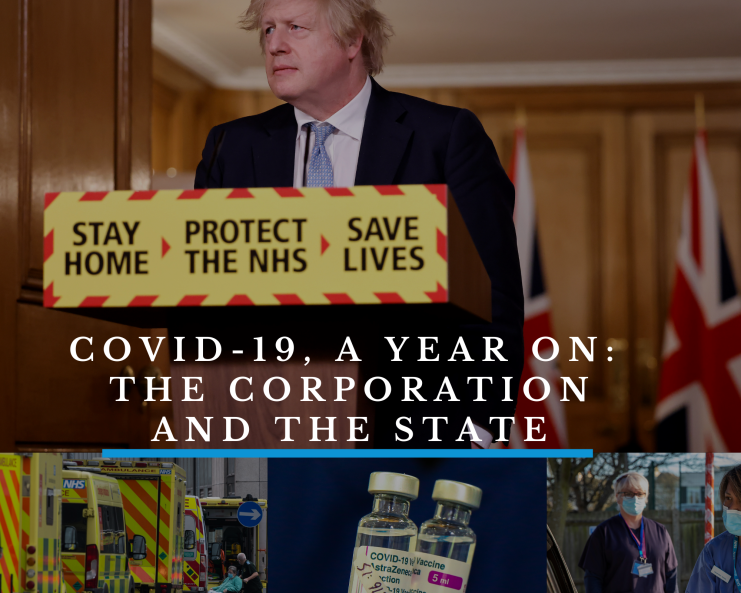Covid-19, a year on: The Corporation and the State

In this series, City A.M. looks back at the last year of the pandemic and Covid restrictions and takes stock of its impact on industries and issues at the heart of British society.
Read more: Read the full Covid-19, a year on series here.
The state and the market have long been locked in a cautious dance. The first corporations pursued national interests on behalf of states, collecting Ancient Rome’s taxes or plundering the new world.
In 1862, the Companies Act created the corporation as we know it, and modern enterprise was born. Since then, statists have sought to restrain the market’s excesses, while free marketeers have tried to free the invisible hand from the grip of the state.
The pandemic has blurred the lines between the two. And it presents an opportunity to choose a third way. Neither back to statism, nor to the rugged individualism of an untrammelled market, but instead onwards to something new.
First, the state rode to the rescue of the private sector, keeping nine million in work with furlough payments, while a million businesses were supported – many saved – by government-backed loans.
Then, the private sector rode to the rescue of the state, first with the production of ventilators and protective equipment, and then with the development of a vaccine: our path out of the pandemic.
Taken together, these mark the greatest shift in the relationship between the public and private sector since the 1940s, when the government seized the levers of industry and pointed them to war.
The lessons from that period are cautionary.
Clement Attlee’s post-war government massively expanded the size of the peacetime state, nationalising great swathes of industry. While the achievements of that government were many, not least the NHS and the welfare state, the benefits for British business were less numerous.
The state ran companies into the ground. Repeated attempts to ‘pick winners’ invariably propped up losers, the awful car manufacturer British Leyland an often cited example.
It took the Thatcher government, inspired by the free market liberalism of thinkers like Milton Friedman, to wrestle much of business out of the state’s dead hand.
But for all the gains in wealth and growth – and Britain post Thatcherism did far outpace its European peers – capitalism has thrown up problems that it has proved itself unable to solve. Most notably of all, climate change.
The past few years have seen a softening of the Friedman consensus within boardrooms across the world. In late 2019, the US Business Roundtable – a club of America’s biggest firms – turned their backs on Friedman’s dictum that a business’s sole responsibility is to its shareholders. Instead, they signed a letter that committed them, somewhat vaguely, to serving all their “stakeholders”.
While there is reason to doubt that this airy, non-binding assertion led to any real change, Covid has. Companies have “acted in the service of the nation,” to borrow a phrase from Tony Danker, the new Director General of the Confederation of British Industry.
The question is what follows, and it seems an ideal moment for something that has bubbled in the background British politics for over a decade: an industrial strategy for Britain.
De rigueur on the continent, most successfully in Germany, the term has long been anathema to admirers of the free market, who associate it with Britain’s dark days as “the sick man of Europe” in the 1970s.
But with Vince Cable as Business Secretary, and then Theresa May as Prime Minister, the promise of an industrial strategy reappeared. Under May, Cable’s old home was renamed the Department for Business, Energy and Industrial Strategy. Boris Johnson promised continuity, with his taste for expansive projects and desire to “level up” Britain.
In this year’s budget, however, an industrial strategy was notable only by its absence. Rishi Sunak, the Chancellor, made no mention of it. This was not oversight. The Industrial Strategy Council, chaired by Andy Haldane of the Bank of England, is being disbanded.
If this marks a return to the sharp separation of state and market and an illustration of Sunak’s Thatcherite core, then that is Britain’s loss.
A far better solution would be a different kind of industrial strategy from those that have failed before. Giles Wilkes, a senior fellow at the Institute for Government and former advisor to Cable and May, published a guide for industrial strategists last year. His recommendations point to a different approach: one in which winners are not picked, but goals are set and investment is made in the relatively few fields where the government can have an impact.
The past year reminds us that the state relies on the market, and the market relies on the state. The ingenuity and resources of the private sector can be directed towards the challenges of the state, but they must not be subsumed by it. We would have failed to learn the lessons of this terrible year, if fear of the latter prevented us from achieving the former, and the extraordinary achievement of finding a vaccine simply fades to memory.